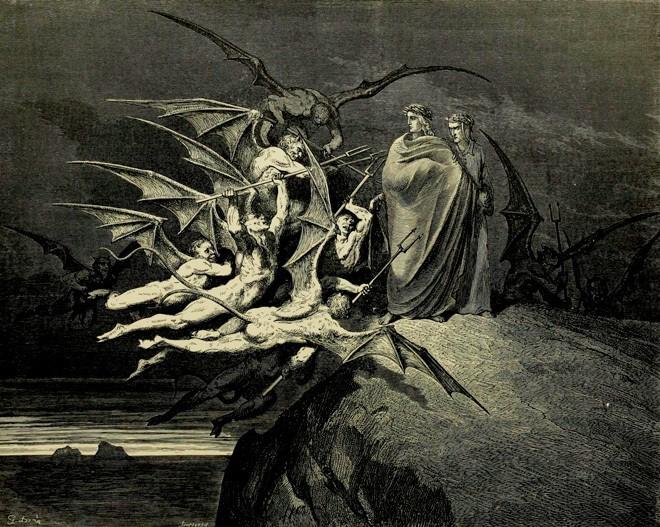
Vision of Hell in Dante's Divine Comedy
Contents:
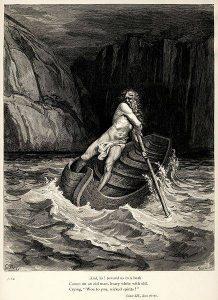
Dante on a Boat - Dante's Journey - Illustration by Gustave Dore to Canto III: Arrival of Charon - Wiki Source
For centuries, Dante's Divine Comedy has been perceived as a kind of metaphor for a journey through hell on earth, and its three-part composition has become almost a symbol of divine order. Literary aesthetics raised the Divine Comedy to the rank. timeless subject... Given the specificity of the biographies of his heroes, it is impossible to read the work without analogies with the modern world. I think that any generation trying to get into the essence of the poem must have experienced similar feelings. And although we are separated from the creation of a work for many centuries, and since then the world has changed dramatically, somewhere deep inside you feel that values identified with the medieval period still exist in our time. If Dante suddenly entered the XNUMX century after leaving the afterlife, he would find people similar to those he met in Hell. The fact that modern civilization is completely different from the one that the poet knew personally does not mean that people have also become better. We know more, we are developing faster, creating new technologies ... But the world is still facing barbarism, rape, violence and degeneration. We, too, are not alien to the smaller sins of which people repented in the "Divine Comedy".
Action "Divine Comedy"
Action comedy it happens in the middle of the author's life... Dante's journey to the afterlife begins on the night of Maundy Thursday to Good Friday, April 7, 1300. Its first stage is "Hell". The hero's descent into hiding can be seen as a dedication, an attempt on humanity. Dante goes to the underworld in company Virgil - the genius of antiquity. Virgil, the messenger of God's Grace, appears at a critical moment for the pilgrim, saving him from physical and moral death. He offers him another path, a path through the underworld - with himself as a guide. Virgil, a pagan born before Christ, has no access to heaven. He also cannot escape and get out of Preada. Therefore, on his later journey, he accompanies Dante. Beatrice... Wandering through the three kingdoms outside the world will heal the soul of the poet and make him worthy to reveal to him what God has ordained for the salvation of all mankind. In the end, Virgil is a spirit who “knew everything,” Beatrice, in turn, is a saved soul, and therefore everything was revealed to her through the contemplation of God. Thus, Dante is not alone on this journey, he inspired mentors and personally experienced special grace. It looks like a sign that he was chosen as a spiritual guide for the entire world at that time and possibly for all future generations. Thus, his experience in the afterlife could teach humanity how to live with dignity and then end up in heaven.
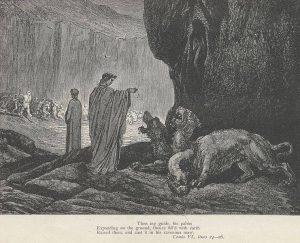
Cerberus guards hell - illustration by Gustave Dore - wiki source
The Divine Comedy consists of three partscorresponds to three worlds - he is there Hell, Purgatory and Heaven... Each part consists of three songs plus an introductory song to the entire poem - a total of one hundred. Hell (wide funnel in the center of the earth) it is divided into ten vertebrae and atria... The kingdom is divided into so many parts Purgatory - high mountain, towering in the middle of the ocean in the Southern Hemisphere, and is at the top Earthly paradise, that is, ten heavens (according to Ptolemy's system) and Empyrum. Sinners associate in hell depending on whether they are to blame for urinary incontinence, rape, or cheating. Those who repent in Purgatory divide according to whether their love is good or bad. The spirits of Paradise are divided into active and contemplative, depending on whether their earthly connection was clouded by their love for God, or whether this love flourished in an active or contemplative life.
Everything is thought out with the utmost precision: in all three parts there are almost the same number of lines, each of which ends with the word "asterisks". It's like an ideal philosophy of life, building the world on reasonable principles. So why are there so many bad people in this environment? Most likely, this is due to the very essence of humanity and the special role of these institutions in Christian ideology.
Hell Vision - circles
Give up all hope, you inbound [here].
Hell extends underground. A gate leads to it, behind which is the Pre-Hell, separated from Hell proper by the Acheron River. The souls of the dead are transferred to the other side by Charon. The poet freely combines biblical and mythological subjects into one whole. Thus, we find in hell such rivers as Acheron, Styx, Phlegeton and Cocytus. Rule in hell is exercised by Minos, Charon, Cerberus, Pluto, Flagia, Fury, Medusa, Minotaur, Centaurs, Harpies and other biblical monsters, as well as Lucifer and a whole host of devils, dogs, snakes, dragons, etc. Hell itself is divided into upper and lower hell.... It is also divided into circles (cer chi), six of which are in the highest hell.
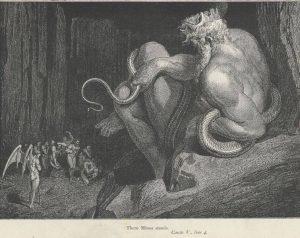
Minos judges people in hell - Gustave Dore - wiki source
First circle
The first circle, called Limbo, contains the souls of great people. Since they were not baptized, they could not go to heaven.
Second round
The second circle, guarded by Minos, is a place of repentance for those who could not control sensuality.
Third, fourth and fifth circles
In the third circle Dante placed sinners guilty of gluttony, in the fourth - the miser and peddlers, and in the fifth - unbridled in anger.
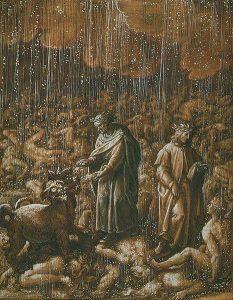
Third circle of hell - Stradan's illustration - wiki source
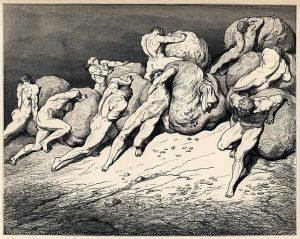
The fourth circle of hell - illustrations by Gustave Dore - wiki source
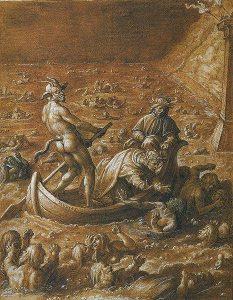
The fifth circle of hell - Stradan's illustration - wiki source
Sixth circle
The sixth circle is depicted as a city. This is the city of Satan, the entrance to which is guarded by very evil demons, against which even Virgil is powerless. In the sixth circle, the souls of heretics repent.
The seventh circle is the opening of the Lower Hell.
The seventh circle opens the Lower Hell and is divided into three areas (gironi). This is a place of eternal suffering for those who committed suicide and violated the laws of nature. There are murderers, suicides, blasphemers and usurers here, led by the Minotaur himself.
Eighth circle
The eighth circle is divided into ten bolgis. This is a place of eternal punishment for those who in any way abused the trust of other people: pimps, seductresses, flatterers, fortune-tellers, swindlers, hypocrites, thieves, false advisers, schismatics, instigators, traitors, etc.
Ninth circle
The ninth circle is the place where the greatest sinners are tormented, this is the farthest place, the center of hell. It is in this circle that the murderers, traitors to their country, friends and family live. These are the souls of people who have betrayed others all their lives for their own benefit.
Hell is a kingdom of darkness and despair, where crying, curses, hates and deceives. The punishment system is adapted to the type of sins. There is constant darkness, sometimes interrupted by flames, which are the instrument of punishment. Storms, rains, winds, lakes diversify the atmosphere of this place. Connoisseurs of Dante's creativity in all parts of the "Divine Comedy" find sharp criticism of Italy and society of that time. Dante's judgment of his contemporaries is harsh but impartial. The vision of lawlessness leading to social decay is also evident in hell. The feeling of disgust for the present day naturally leads the poet to admiration for the past. So, from the great spirits in the vestibule of hell, who received God's grace through their natural virtues, we come to those saints who have done much good for the world. So, if Dante used the lessons of a hellish nightmare, he could become a good and just leader, ruler, leader, etc., positively influencing people and able to release the best in them.
Divine Comedy Characters
So Cleopatra can see; imprisoned
Elena, the cause of the fall of the Trojans;
I see Achilles the brave hetman,
Who fought to the end for love
I can see Paris and see Tristan;
A thousand are lost in the madness of love
Here I recognize souls from the mouth of my Lord.
And when I listened to the Master to the end,
What ladies and knights have shown me
Pity overwhelmed me, and I stood in confusion.
An important source of dynamics in The Divine Comedy is the human figures known to the author from ancient and modern history, and Dante himself is a living person who enters them to bring memories to life. When a poet's soul meets other souls, emotions take shape. In the poet's words, conflicting feelings are felt: compassion, affection, love for masters, sympathy, contempt. The presence of a living person among the cursed souls makes them forget about suffering for a moment and be transported into the world of memories. As if they are returning to old passions. Not all ghosts were portrayed as cruel sinners. Many of them retain a wealth of feelings. There are even rough scenes. The poet, who is involved in all this, is also touched.
We owe this wealth of inspiration in hell to a series of episodes (Francesca, Farinata, Pierre della Vigna, Ulysses, Count Ugolino and others) with such expressive power that is not found in scenes from Purgatory or Paradise. A varied gallery of characters who forget about their suffering upon contact with the poet is similar to scenes from a psychotherapy session. So why couldn't Dante become a psychologist, psychiatrist, therapist, physician, etc.?
In hell, the poet also presented a dignified and respectable body, closed in silence and concentration. Seriousness and peace accompanied the pilgrim through the first circle of hell. There were Homer, Horace, Ovid, Lucan, Caesar, Hector, Aeneas, Aristotle, Socrates and Plato. This crowd bestowed upon the poet the honor of being one of the "mighty of this world." The title given by the sages of the world of that time is a kind of ennobling and inspiration for creative life, knowledge of the secrets of the world, meeting people and creating great works for posterity.
In The Song of the Fifth Hell, the author acquaints the reader with the second tier of the hellish abyss, where souls suffer torment for knowingly and voluntarily committed sins. An endless crowd of ghosts flows towards the poet, the screams and cries of the damned are heard around. The unfortunate ones are thrown up by a merciless hurricane, symbolizing the passions that torment people. Dante's interlocutor, Franz de Rimini, comes out of the crowd and tells a special story that happened during the fratricidal battles. The poet actually learned a wonderful story about vicious lovers in the last years of his life with Guidon Novel, whose aunt was Francisca. Francisca was born in the middle of the XNUMX century. She was married for political reasons (to prevent a family war) to the ugly and lame ruler of Rimini, Gianciotta Malatesta. However, she fell in love with Paola, her husband's younger brother, who was already married and had two children. One day, Francisca's husband caught them in a deception and killed them both in a fit of madness. This fact caused a scandal in Rimini. The presentation of this true story in the work of Dante is accompanied by reflections on the eternal judgments of God. The meeting between Francesco and Paolo has dramatic features. This is the only moment when a poet in hell fainted precisely because of the experience of the love afflictions of Francisco and Paolo. This special sensitivity of Dante puts him in the ranks of wise, calculating, sympathetic and kind people. Thus, nothing prevents him from becoming the spiritual leader of any religion, organization, legislative institution, mediator, teacher, etc. After leaving the afterlife.
The experiences of hell are so emotional that they can be shared with many people. One lonely poet cannot take full advantage of them. If, however, he had the qualities of a good leader and organizer, his activities could help to reduce the ranks of sinners, murderers, tyrants, rapists, swindlers, etc. Perhaps the medieval world would not have been so gloomy.
References:
1. Barbie M., Dante. Warsaw, 1965.
2. Dante Alighieri, Divine Comedy (the chosen one). Wroclaw, Warsaw, Krakow, Gdansk 1977.
3. Ogog Z., Singing of Francis in Dante's "Hell". "Polonistika" 1997 No. 2, p. 90-93.
Leave a Reply